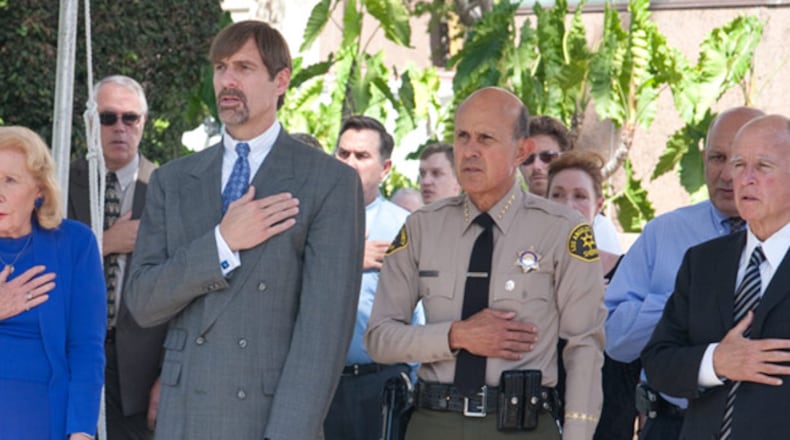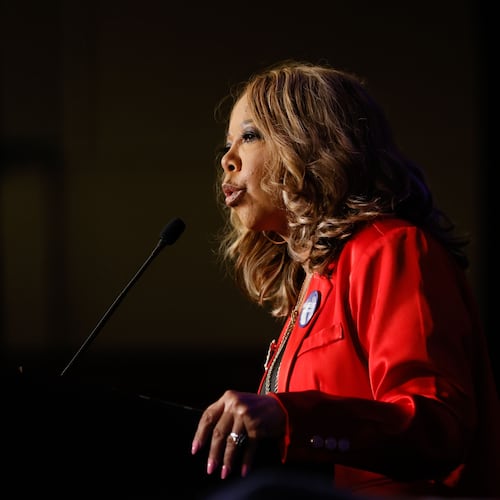A California billionaire put $8.3 million into a campaign to pass a constitutional amendment this fall in Georgia. A San Francisco mega-donor gave $3.25 million to a political action committee backing Stacey Abrams’ gubernatorial bid.
And a D.C. Republican PAC barely waited for the GOP gubernatorial runoff votes to be tallied before spending $2 million on ads attacking Abrams in support of its party’s nominee, Brian Kemp.
Out-of-state political money is flowing into Georgia like never before, and election watchers say the money disclosed by so-called “independent groups” and PACS in recent days is only the beginning.
After all, much of the "dark money" — cash used to pay for TV ads and mailings by groups that don't disclose their financiers — typically doesn't show up until late in the race.
William Perry of Georgia Ethics Watchdogs said Georgians should expect most statewide campaign advertising to be funded by outside groups, rather than the candidates themselves.
“That is going to become the norm for general elections because partisan groups are forming to fund these elections and candidates are depending on them,” Perry said.
“Generally, I am OK with it (money) coming from out-of-state as long as it’s properly disclosed,” he added. “I think it is an issue voters should consider. If somebody can’t raise most of their money from the state (of Georgia), why should we elect them?”
Out-of-state money has already played a major role this election season. Abrams' campaign to become the nation's first African-American female governor has created a national buzz and brought in big money from out-of-state donors, big and small. Other Democratic candidates, such as lieutenant governor nominee Sarah Riggs Amico, have benefited as well.
“People across Georgia — and around the country — are excited about the incredibly strong slate of candidates Georgia Democrats have on the ballot this year,” Amico said.
A dark-money Washington D.C. group spent more than $3 million on ads hammering state Sen. David Shafer in the lieutenant governor's GOP runoff race, a contest he narrowly lost to former Rep. Geoff Duncan.
Duncan’s team acknowledged those ads and mailings played a role in the result.
“Independent groups,” which aren’t directly affiliated with campaigns but often support a candidate, and organizations backing proposed constitutional amendments on November’s ballots, have been filing their first post-runoff disclosures in recent weeks.
Under state law, donors can give a limited amount of money directly to candidates — about $17,000 for the primary, runoff and general election races combined. But there are no limits on how much they can give to independent committees or to the groups that fund them.
The biggest reported outside donation in Georgia so far came from Henry Nicholas, a California billionaire who founded the semiconductor company Broadcom Corp., and his victim's rights foundation. They have put $8.3 million into the campaign to pass Georgia's proposed Marsy's Law constitutional amendment.
Nicholas did so despite the fact that the amendment is expected to easily pass.
The measure, similar to those passed in other states, would require notification of victims before court hearings for those accused of harming them. Victims would also gain the right to be heard in court before a defendant is released, enters a plea or is sentenced.
The laws are named after Marsy Nicholas, Henry Nicholas’ sister, who was stalked and murdered by her ex-boyfriend in 1983.
Several outside groups supporting Abrams’ campaign also recently filed, none with more money than PowerPAC, which has collected $3.45 million. Almost all of that has come from Susan Sandler, a San Francisco philanthropist whose husband co-founded PowerPAC. The group expects to spend $10 million on the race, according to the San Francisco Chronicle.
PowerPAC released a TV ad last week hitting Kemp over a proposal to shut down seven of the nine polling places in rural and majority-black Randolph County in southwest Georgia. As Secretary of State, Kemp oversees elections. However, the proposal was considered by local election officials, who ultimately decided against closing the polling places, and Kemp voiced opposition to it.
The state Democratic Party, which received $1 million from New York billionaire mega-donor George Soros in June, has also already paid for attack ads against Kemp.
Meanwhile, the Washington D.C.-based Republican Governor’s Association reported spending about $2 million on ads slamming Abrams over her handling of her finances and her support for gun control measures.
That’s likely just a starting point: the RGA spent $10 million in Georgia during the last two races for governor.
Some independent groups and organizations report the source of their money, while others don't. The proliferation of outside spending recently persuaded a mix of politicians, activists and watchdog groups in Georgia to launch a coalition to combat the growing influence of campaign funders who don't say where their money is coming from.
State Sen. Josh McKoon, R-Columbus, a member of the group, said he worries that outside money will decide major elections in Georgia.
“I have a problem with it, and I don’t care who benefits from it,” McKoon said. “The idea that we are going to allow unlimited amounts of money to be spent on state offices by people from other states, I don’t understand the rational to that.
“That seems to be a bad policy, to empower entrenched special interests that don’t have a nexus in Georgia. Some billionaire that lives in California or New York seems to have more influence than thousands of Georgia voters.”
Some of the big-spending groups and what they’d disclosed so far:
Marsy’s Law for Georgia (constitutional amendment)
$8.3 million
PowerPAC (Pro-Stacey Abrams)
$3.45 million
Hometown Freedom Action Network (Pro-Geoff Duncan)
$3.28 million
Republican Governor’s Association (Pro-Brian Kemp)
$2 million
Changing Georgia’s Future (Pro-Casey Cagle)
$1.6 million
Conservatives for a Sronger Georgia (Pro-David Shafer)
$1.3 million
Black PAC (Pro-Abrams)
$1.1 million
Source: State ethics commission campaign disclosures
About the Author
Keep Reading
The Latest
Featured




